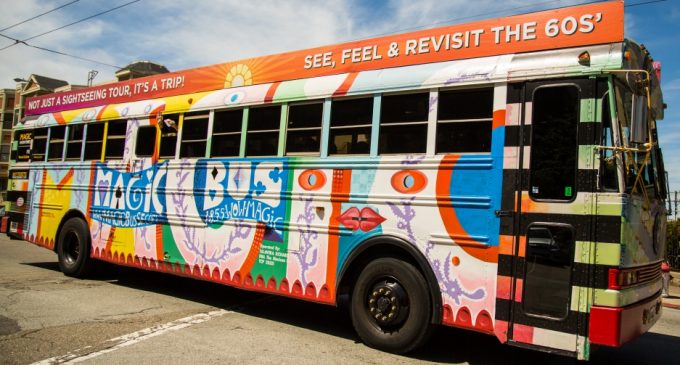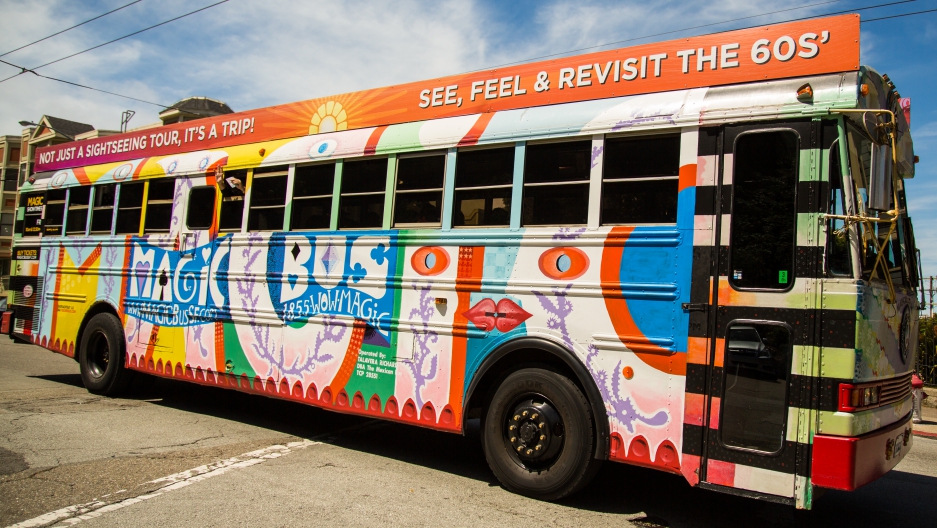Looking back at ‘The Summer of Love’ | Public Radio International

This weekend, I’m hosting an hour-long special on the BBC World Service, looking back at that wild revolutionary moment in the cultural and political life of America. And really the world.
I met some fascinating people in San Francisco making this radio documentary for the BBC, and I want to share with you some of what they told me. Because when you look around America and the world in 2017, it’s hard not to think back about what a small community did to challenge the establishment 50 years ago.
At the Haight-Ashbury annual street fair last month, I met a man who was thinking about all this. His name is Helger and he was born in 1967.
Helger is German. He and his wife moved to the Bay Area for work about a decade ago. They loved it and decided to stay.
I asked him whether the hype around the 50th anniversary of the Summer of Love is nostalgia — or something else.
“I mean you know who [is] the president of the United States, and what we’re seeing around the world, whether it’s in Turkey or in other countries. We see a movement of democracy being abolished in some of the countries,” he said. “I think it’s important for us to go out again and connect to people in real life and try also to have a conversation. I mean maybe we’re a good example.”
Dennis McNally, former publicist for the Grateful Dead and a historian of the Summer of Love, said the cultural life of America was fermenting in said Haight-Ashbury in 1966.
“They experimented with psychedelics, with consciousness, with sexuality, with music, with all kinds of things.”
“They experimented with psychedelics, with consciousness, with sexuality, with music, with all kinds of things.”
The ones doing the experimenting were an eclectic mix of artists and writers, from Jerry Garcia and Grace Slick to Allen Ginsberg and Ken Kesey. They were folkies and jazz cats — actors and dancers. There were local business owners in the Haight, college kids, high school dropouts and people who just wanted to be part of the scene.
“They had such a good time that, at the end of it, they said, ‘let’s throw a party,’” said Dennis.
A party that would last, in theory, for three months. … Word spread fast.
School was out, and the idea of being part of something exciting, radical and fun drew as many as 100,000 people to the streets of Haight-Ashbury that summer. The streets of the Haight were constantly packed.
Joel Selvin, a writer and former rock critic for the San Francisco Chronicle, said “San Francisco was this glorious beacon of this new life and it echoed throughout the world.”
South African trumpeter Hugh Masekela had fled the apartheid regime back home, and became part of the LA music scene. In June of 1967, Masekela played the Monterey pop festival. Before he had his big 1968 hit “Grazin’ in the Grass,” he was grazin’ in something else.
“When you walked down the Haight Ashbury at any time, it was difficult to find somebody who wasn’t floating,” he said.“When you say everybody was ‘floating’ in the Haight, what do you mean?” I asked.“They were high. Everybody was high,” he answered.
“Were you high?” I asked. Of course, he said.
“Did you try LSD in California?” I asked.
“I didn’t try it. I took it. I took it regularly. … Very few people were not tripping,” Masekela explained.
Just imagine the freedom the Haight presented for a young black artist from apartheid-era South Africa.
And, remember what else was going on in the world. It was the Cold War. Vietnam was at full tilt. The civil rights movement had gripped America.
Harry Strauch provides a pretty clear sense of the mood in the country — and the world — back in 1967.
His family had emigrated to the Bay Area from Vienna, and he ended up in the Haight, opening what was probably the first head shop in the US — In Gear. But in between, he made a stop at Harvard, where he saw the schisms in America on full display.
“I went to Harvard University where Henry Kissinger and Timothy Leary were teaching, both at the same time, in the same building where I was the philosophy librarian. And that was in Emerson Hall,” he said. “And at each end of the building there were two lecture halls. And sometimes I would go down to one, and there was Kissinger talking about Realpolitik, and it was all loaded with these young future senator types. And at the other end of the hall was Leary talking to the psychology graduate students, and they were all taking mushrooms with the prisoners in the state’s prison system.”
Yeah kind of mindblowing. But that image neatly sums up the 60s.
Source: Looking back at ‘The Summer of Love’ | Public Radio International




There are no comments at the moment, do you want to add one?
Write a comment